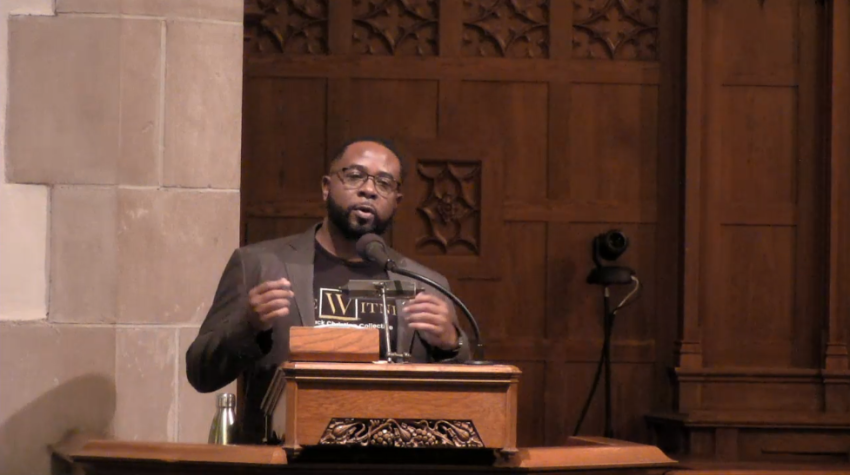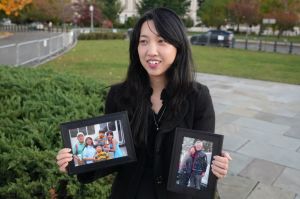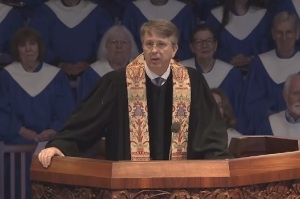Jemar Tisby chides Grove City College for calling his invitation to speak in chapel 'a mistake'

Jemar Tisby, a well-known Christian author and president of The Witness, a multimedia platform about race, religion, politics and culture, chided leaders of Grove City College in Pennsylvania for calling a decision to allow him to speak in the school’s chapel about race in 2020 “a mistake.”
A special GCC committee comprised mainly of board members of the unaffiliated Christian liberal arts college released a 23-page report on April 13. They defended the college from “allegations of mission-drift.” The move came after the college was accused in a petition launched by a group of parents and former students of promoting critical race theory.
“Grove City College has not changed. It remains a Christ-centered, conservative institution. GCC’s Board and president are firmly committed to its historic vision, mission, values, and character,” the committee wrote.
In the report, the committee members highlighted the dangers of critical race theory and several reasons the theoretical framework is incompatible with a biblical worldview.
The report also cited what it considers to be several missteps that led to the theory’s promotion on campus, including allowing Tisby, whose works include The Color of Compromise and How to Fight Racism, to speak at the chapel.
“Most of those in GCC leadership with whom we spoke observed that ‘the Jemar Tisby that we thought we invited in 2019 is not the Jemar Tisby that we heard in 2020 or that we now read about.’ They allow that, in hindsight, inviting Mr. Tisby to speak in chapel was a mistake,” the committee wrote.
“And they say that in the future, such speakers should be treated as one of the many guest lecturers that visit campus to teach a class or speak in a lecture hall; inviting anyone to speak in chapel appears to place the College’s stamp of approval on the speaker’s message.”
Critical race theory is a framework through which some scholars seek to understand how victims of systemic racism are affected by cultural perceptions of race and how they can represent themselves to counter prejudice. Scholarship on the theory, which is mainly taught in law schools, traces racism in America through the legacy of slavery, the civil rights movement and recent events.
In his speech at GCC in October 2020, Tisby urged his audience to join the racial justice movement. His speech came just months after an explosive racial reckoning was triggered worldwide by the killing of African American George Floyd by police in Minneapolis, Minnesota, that May.
“The morning of the chapel presentation, I made the settled determination not to douse the fire in my bones. Instead I drew inspiration from the Black church tradition and its hallmark of powerful, poetic, and prophetic preaching,” Tisby wrote in op-ed on Substack last Friday.
“I went on to explain the urgency of the racial justice movement happening in our midst, and the need to address anti-Black police brutality,” he added. “I spoke of the complicity and compromise with racism that many Christians had displayed in previous eras, and how we as followers of Christ had to make a decision about whether we would stand on the side of justice in our day.”
He said that after his speech, students applauded and “the majority of those with whom I spoke in the next few moments expressed support.”
Tisby wrote that he was surprised that he was branded in the petition from parents and alumni as an “outspoken apologist for CRT.”
“I’m an outspoken apologist for CRT? No. I have studied history. Looking at the sordid acts of cowards who called the name of Christ and compromised with racism is what informs my views,” he stressed. “This group of parents and former students perpetuates the pernicious practice of labeling virtually any language or concept about race and justice as Critical Race Theory.”
After reactions from GCC President Paul J. McNulty and faculty members of Grove City College writing a response decrying the college's handling of the outrage from parents, the school’s board of trustees formed a committee to review the situation and produced the report released earlier this month.
“The entire report reeks of fear and a reactionary posture inimical to the educational mission of a college or university,” Tisby said.
“The committee cited ‘racial separatism’ as a bogeyman even as they paid no attention to the racism that Black people and other people of color experience on a daily basis. A level of prejudice that necessitates we form spaces of refreshing and flourishing (hence the entire existence of historically Black churches and denominations),” he added.
In reaction to the claim that he had changed his views between 2019 and 2020, Tisby argued that it could be the leaders of the college who changed to appease their audience.
“Perhaps it is not I who changed, but the leaders at Grove City College,” he wrote. “Perhaps the social and political climate of the nation has caused institutions to more clearly declare their allegiances and some, such as Grove City College, have chosen to side with the forces that conserve business-as-usual when it comes to race.”



























